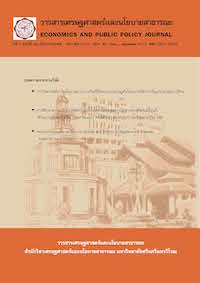การวิเคราะห์ความผันผวนทางการเงินที่มีต่อระบบเศรษฐกิจไทยภายใต้การเป็นประชาคมอาเซียน
Main Article Content
บทคัดย่อ
การวิจัยครั้งนี้มีวัตถุประสงค์เพื่อศึกษาผลกระทบของความผันผวนทางการเงินที่เกิดจากเงินทุนเคลื่อนย้ายระหว่างประเทศต่อตัวแปรเศรษฐกิจมหภาค โดยแยกตามประเภทการลงทุนและแหล่งที่มาของการลงทุน ผลการศึกษาพบว่า การลงทุนโดยตรงจากต่างประเทศมีเสถียรภาพมากกว่าการลงทุนในหลักทรัพย์และเงินกู้จากต่างประเทศ อีกทั้งมีส่วนช่วยรองรับความผันผวนของการลงทุนในหลักทรัพย์ ซึ่งการลงทุนโดยตรงส่วนใหญ่มาจากกลุ่มประเทศ + 3 (ญี่ปุ่น จีน ฮ่องกง และเกาหลีใต้) มากกว่าประเทศสมาชิกอาเซียน 10 ประเทศ สำหรับการลงทุนในหลักทรัพย์และเงินกู้จากต่างประเทศส่วนใหญ่มาจากกลุ่มประเทศนอกอาเซียน + 3 โดยเฉพาะสหภาพยุโรป และสหรัฐอเมริกา
ผลการวิเคราะห์โดยใช้แบบจำลอง Vector Autoregressive Model พบว่า การเปลี่ยนแปลงอย่างฉับพลันหรือการ Shock ของเงินทุนเคลื่อนย้ายระหว่างประเทศส่งผลกระทบต่อเศรษฐกิจในช่วงเวลาสั้นๆ ซึ่งก่อให้เกิดความผันผวนทางการเงินโดยผ่านตัวแปรทางการเงิน (ดัชนีราคาหุ้นในตลาดหลักทรัพย์ และอัตราแลกเปลี่ยน) และขึ้นอยู่กับประเภทของการลงทุน ถ้าเป็นการลงทุนในหลักทรัพย์และเงินกู้จากต่างประเทศก่อให้เกิดความผันผวนทางการเงินมากกว่า ซึ่งพิจารณาได้จากอัตราแลกเปลี่ยน และดัชนีราคาหุ้นในตลาดหลักทรัพย์ได้รับผลกระทบเร็วที่สุดและมากที่สุด และถ้าเป็นการลงทุนโดยตรงจากต่างประเทศส่งผลกระทบต่อตัวแปรเศรษฐกิจจริงมากที่สุด (การลงทุนภาคเอกชน และผลิตภัณฑ์มวลรวมภายในประเทศ)
เมื่อวิเคราะห์โดยแยกแหล่งที่มาของการลงทุนพบว่า เงินทุนเคลื่อนย้ายระหว่างประเทศจากกลุ่มประเทศอาเซียน + 3 ก่อให้เกิดความผันผวนทางการเงินมากกว่านอกกลุ่มอาเซียน + 3 ส่วนการ Shock ของเงินทุนเคลื่อนย้ายระหว่างประเทศจากนอกกลุ่มประเทศอาเซียน + 3 ก่อให้เกิดความผันผวนทางเศรษฐกิจด้วย สำหรับตัวแปรในแบบจำลองที่มีส่วนกำหนดการลงทุนโดยตรงจากต่างประเทศมากที่สุดคือผลิตภัณฑ์มวลรวมภายในประเทศ ส่วนการลงทุนในหลักทรัพย์จากต่างประเทศขึ้นอยู่กับการส่งออกสุทธิมากที่สุดดังนั้นการส่งเสริมการส่งออกโดยการแสวงหาตลาดใหม่ๆ ย่อมสนับสนุนให้การส่งออกและผลิตภัณฑ์มวลรวมภายในประเทศขยายตัวอย่างต่อเนื่อง ซึ่งมีส่วนช่วยดึงดูดการลงทุนจากต่างประเทศ
Analysis of Financial Volatility on economy of Thailand under the ASEAN Community
This research aimed to study the impact of financial volatility caused by international capital on the macroeconomic variables, by type of investment and source of investment. The study show that foreign direct investment was relatively stable, rather than portfolio investment and foreign loan and accommodate volatility in portfolio investment. The foreign direct investment was mainly from the country + 3 (Japan China Hong Kong and South Korea) than the ASEAN 10 countries, the portfolio investment and foreign loan was mostly from outside the ASEAN + 3 especially the European Union and the United States of America.
Results by vector autoregressive model showed that sudden change or shock of international capital affected to short time economy. Which caused financial volatility through financial variables (stock price index and exchange rate) and depended on the type of investment. If portfolio investment and foreign loan caused over financial volatility, obtained from the exchange rate and stock price index was affected the most and fastest and foreign direct investment affected to most real economic variables. (private investment and gross domestic product)
When analyzed by source of investment, international capital flow from the ASEAN + 3 caused financial volatility than outside the ASEAN + 3, the shock of international capital flow outside the ASEAN + 3 caused with economic volatility. The variables in the model has determined the foreign direct investment volatility was based on the gross domestic product and the portfolio investment based on net export the most. Thus boosting exports by seeking new markets encourage export and gross domestic product continuous expansion, which has helped attract foreign investment.
Article Details
สงวนลิขสิทธิ์ © 2553 คณะเศรษฐศาสตร์ มหาวิทยาลัยศรีนครินทรวิโรฒ
คณะเศรษฐศาสตร์ มหาวิทยาลัยศรีนครินทรวิโรฒ จัดพิมพ์วารสารเศรษฐศาสตร์และนโยบายสาธารณะ เพื่อเผยแพร่บทความวิชาการทางเศรษฐศาสตร์ นโยบายสารธารณะ และสาขาอื่นๆที่เกี่ยวข้อง ทัศนะและข้อคิดเห็นใดๆ ที่ปรากฏในวารสารเป็นความคิดเห็นส่วนตัวของผู้เขียน โดยบทความที่ได้รับการตอบรับจะถือเป็นลิขสิทธิ์ของคณะเศรษฐศาสตร์ มหาวิทยาลัยศรีนครินทรวิโรฒ
บรรณาธิการ ผู้ช่วยศาสตราจารย์ ดร.ณัฐญา ประไพพานิช

